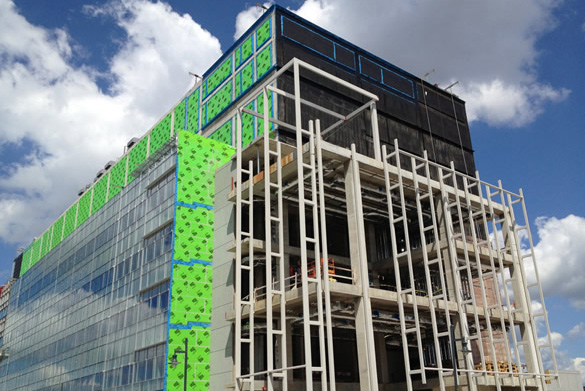Targeted Industries

The Baltimore Workforce Development Board has selected eight targeted industries for workforce development. To choose the most promising industries, the Board analyzed current need, wage growth, past employment growth, projected employment growth, the potential for career ladders, and availability of entry-level jobs. The current or projected availability of local economic development support and grant funding was also considered.
Health Care and Social Assistance
This industry comprises establishments providing health care and social assistance for individuals. Trained professionals deliver the services provided by establishments in this sector. Many of the industries in the sector are defined based on the educational degree held by the practitioners included in the industry.
Bioscience
The Bioscience sector includes industries that are “biology driven, and their activity substantially involves research, development or manufacture of the following:
1) Biologically active molecules;
2) Devices that employ or affect biological processes; and
3) Biological information resources.”
Within this broad definition, the target sector includes the following employers:
1) Private sector (Bioscience companies- R&D, Service and Manufacturing, Testing labs such as Quest Diagnostics, and Hospital Labs such as University of Maryland Medical Center);
2) Higher Education (University research labs);
3) Federal Labs (such as National Institutes of Health); and
4) Research Institutes.
Business Services
The Business Services sector includes the following industries:
1) Accounting, Tax Preparation, Bookkeeping, and Payroll Services;
2) Management Consulting Services;
3) Advertising and Related Services;
4) Management of Companies and Enterprises (except government establishments) that administer, oversee, and manage establishments of the company or enterprise and that normally undertake the strategic or organizational planning and decision-making role of the company or enterprise; and
5) Administrative and Support Services.
Computer, Internet, and Software Related Data Services
This industry includes:
1) Internet Publishing and Broadcasting;
2) Internet Service Providers and Web Search Portals, and Data Processing Services; 3) Computer Facilities Management Services (including establishments primarily engaged in providing on-site management and operation of clients' computer systems and/or data processing facilities as well as establishments providing computer systems or data processing facilities support services).
Construction
The Construction sector comprises establishments primarily engaged in the construction of buildings or engineering projects. Construction work done may include new work, additions, alterations, or maintenance, and repairs. Activities of these establishments generally are managed at a fixed place of business, but they usually perform construction activities at multiple project sites. Production responsibilities for establishments in this sector are usually specified in:
1) contracts with the owners of construction projects (prime contracts) or
2) contracts with other construction establishments (subcontracts).
Hospitality and Tourism
The Hospitality and Tourism sector includes the following industries:
1) Retail Trade;
2) Food and Beverage;
3) Clothing and Clothing Accessories Stores;
4) Sporting Goods, Hobby, Book, and Music Stores;
5) General Merchandise Stores;
6) Miscellaneous Store Retailers (Does not include motor vehicles and parts; new furniture and house furnishings; new appliances and electronic products; new building materials; and garden equipment and supplies; food and beverages; health and personal care goods; gasoline; new clothing and accessories; and new sporting goods, hobby goods, books, and music);
7) Scenic and Sightseeing Transportation;
8) Convention and Visitors Bureaus;
9) Convention and Trade Show Organizers;
10) Performing Arts, Spectator Sports, and Related Industries;
11) Accommodation Industries; and
12) Food Services and Drinking Places (Including full-service restaurants; limited-service eating places; special food services, such as food service contractors, caterers, and mobile food services; and drinking places).
Port and Port-Related Services
The Helen Delich Bentley Port of Baltimore is one of the most significant contributors to the economy of both the City of Baltimore and the State of Maryland as a whole. The Port impacts over 42,000 jobs, of which nearly 20,000 are direct jobs generated by cargo and vessel activities. The remaining jobs are supported by the spending of port-related businesses and holders of direct jobs. Some of the industries that have direct exposure to the port include:
1) Vessel Piloting Services;
2) Longshoreman and Cargo Specialist Providers;
3) Other Maritime Service Providers;
4) Transportation Providers (including both rail and truck shipping services); and
5) Warehousing and Distribution Service Providers.
Sustainable Energy and Environmentally-driven Services
Today’s so-called “green-collar” jobs are ones that focus on either the conservation of energy and natural resources, the restoration of the environment, or the mitigation of pollution. Thus, sustainable energy occupations could relate to the installation of green roofs, the auditing of energy use for an office building, the installation and/or manufacturing related to renewable energy sources (solar, geothermal, etc.), the installation of energy-efficient retrofits in existing industrial facilities, or new construction utilizing “green” building practices. Environmentally driven occupations would include those in: brownfields restoration, urban agriculture, the recycling of obsolete computers or other IT equipment, or those related to the de-construction of homes and the recycling of select building materials. These green-collar jobs could offer many Baltimore residents the chance to be productively engaged in the workforce and thus better able to support themselves and their families financially.